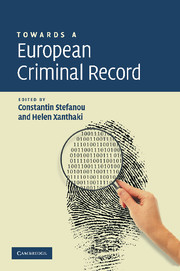Book contents
- Frontmatter
- Contents
- List of contributors
- Preface and acknowledgements
- 1 Introduction: How did the idea of a European Criminal Record come about?
- PART I
- PART II
- PART III
- 16 Databases in the area of freedom, security and justice: Lessons for the centralisation of records and their maximum exchange
- 17 A European criminal records database: An integrated model
- 18 The European Criminal Record: Feasible or folly?
- 19 Conclusions
- Index
18 - The European Criminal Record: Feasible or folly?
Published online by Cambridge University Press: 13 July 2009
- Frontmatter
- Contents
- List of contributors
- Preface and acknowledgements
- 1 Introduction: How did the idea of a European Criminal Record come about?
- PART I
- PART II
- PART III
- 16 Databases in the area of freedom, security and justice: Lessons for the centralisation of records and their maximum exchange
- 17 A European criminal records database: An integrated model
- 18 The European Criminal Record: Feasible or folly?
- 19 Conclusions
- Index
Summary
Introduction
The need to enhance the effectiveness of the process for the exchange of data from national criminal records is now widespread. However, proposals for a European Criminal Record (ECR) as a tool for achieving such effectiveness have been criticised mainly for an alleged lack of feasibility. Having discussed the legal, political and human rights requirements for feasibility of the ECR both at the EU and the national levels in previous chapters of this book, this chapter aims to focus on aspects of the ECR proposal that guarantee legitimacy and consequently feasibility of the proposal both as a legislative form and as legal substance.
Feasibility of the ECR proposal: The Sutherland criteria
Assessment of any legislative measure at the EU level is undertaken on the basis of the five Sutherland criteria: need for action, choice of the most effective course of action, proportionality of the measure, consistency with existing measures, and wider consultation of the circles concerned during the preparatory stages.
The need for action in this area derives from the ineffectiveness of current mechanisms for mutual legal assistance in criminal matters at an international level. National criminal records have proven ineffective as inadequate, inaccurate and incomplete, especially with reference to crimes committed by foreigners in the jurisdiction or own nationals abroad, even though mobility of persons, services and, consequently, crime in the EU has increased. The problem presents itself in two dimensions.
- Type
- Chapter
- Information
- Towards a European Criminal Record , pp. 354 - 377Publisher: Cambridge University PressPrint publication year: 2008



